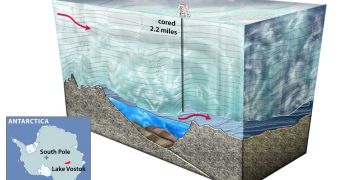It seems that the years of effort are paying off, Russian scientists now claim that they have discovered a type of bacteria unlike any seen before, in the subglacial Lake Vostok in Antarctica.
DNA analysis indicates that this bacteria is not only new, it's not even related to any of the bacteria types that have been identified on Earth, its DNA is only 86 percent like that of other life forms.
Russian scientists have been trying to recover samples from the isolated Lake Vostok for years. But the lake is buried beneath a few kilometers or miles of ice.
The researchers only managed to get to it last year, but the sample they retrieved was contaminated. It didn't show any traces of life either.
But new samples recovered this season are a lot more promising. In fact, scientists are convinced they found a new life form.
Considering that it's so different from anything known to science, it's safe to assume that it wasn't brought down by the drilling equipment and is native to the isolated lake. New samples and further analysis is needed to confirm this though.
Lake Vostok has been isolated from the world for millions of years. Beneath the ice, the water managed to remain liquid, though cold, mainly through geothermal energy.
No light arrives so far down, so any life form there would have to survive on the scant resources available, mostly minerals from the rock bed.
The hope is that, if life can survive in such extreme and remote conditions it may survive outside Earth as well.
Conditions in Lake Vostok are thought to be similar, at least in some ways, to those in the under-ice ocean on Jupiter's moon Europa, one of the best candidates for finding extraterrestrial life in our solar system. If life is confirmed to exist in Lake Vostok, all manners of scientists will be extremely happy and hopeful.

 14 DAY TRIAL //
14 DAY TRIAL //